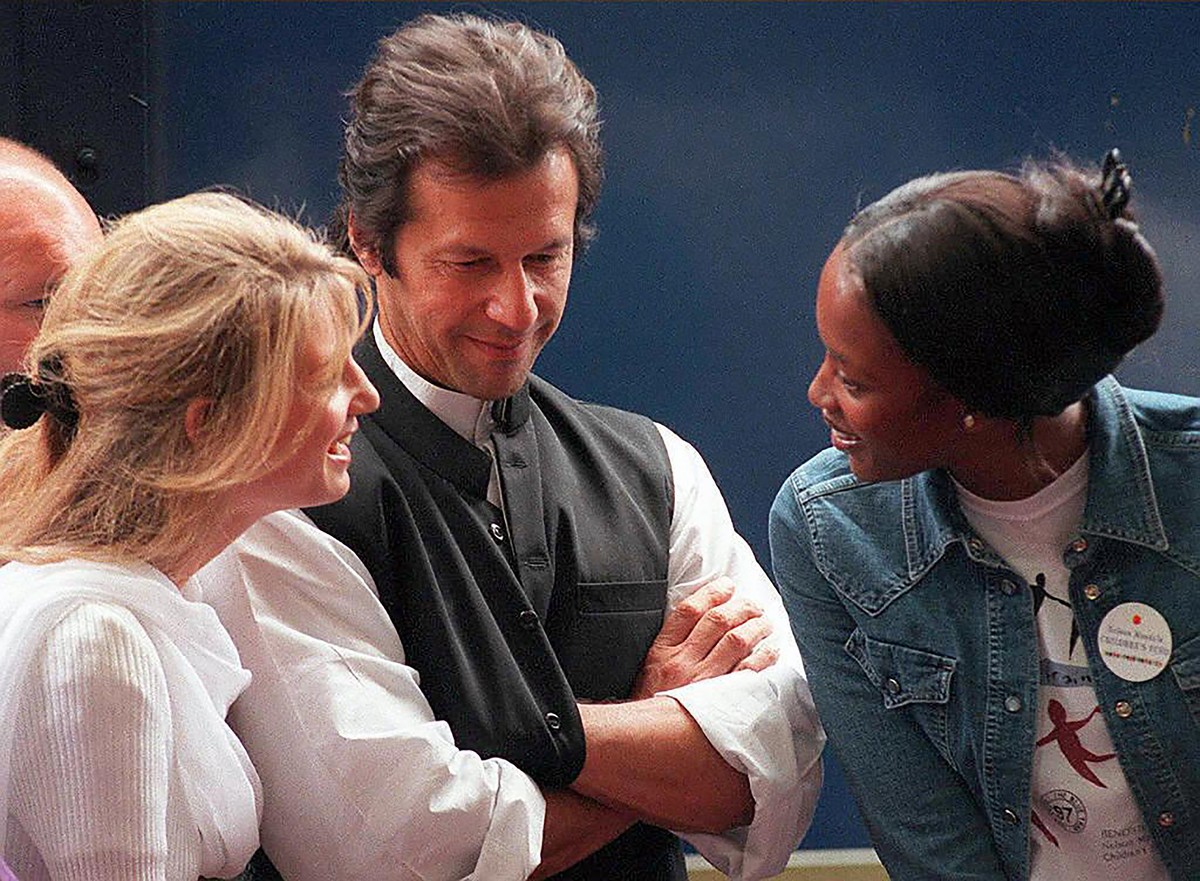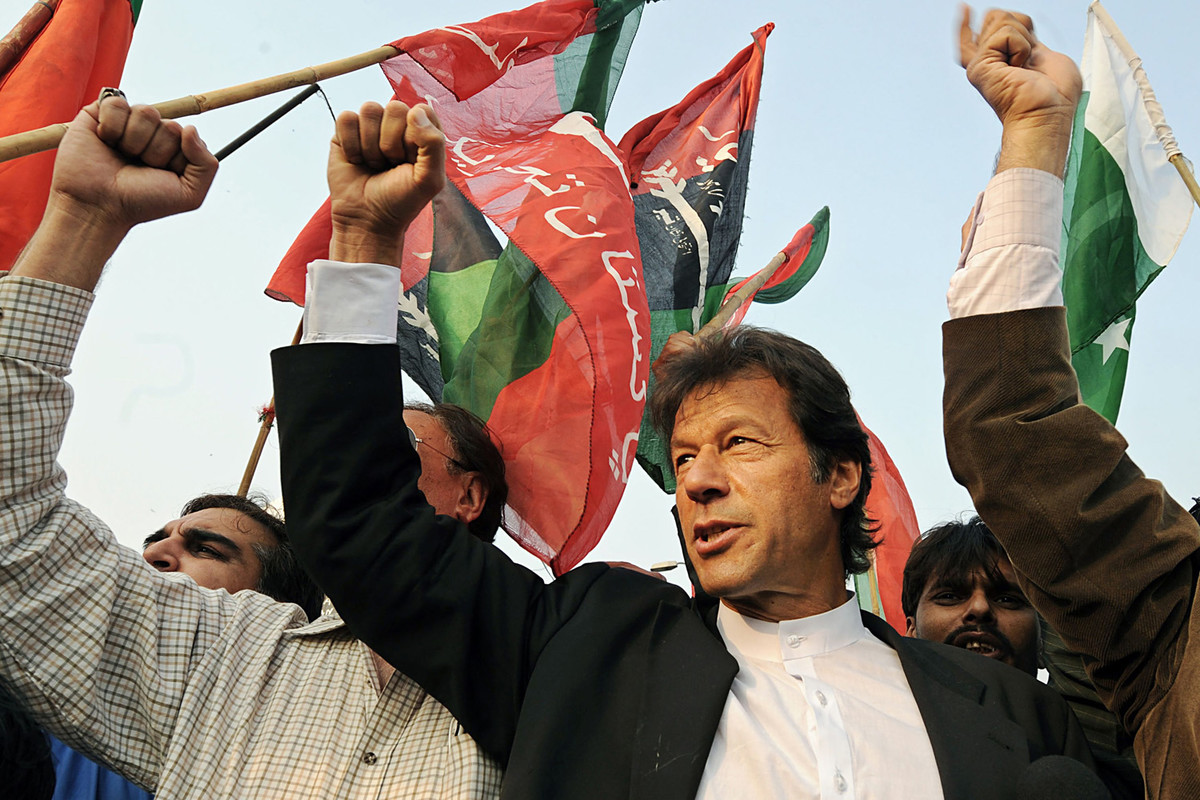ISLAMABAD: Imran Khan was catapulted to global fame as a World Cup cricket champion, but the man known in the West as a celebrity playboy is now seeking to lead Pakistan as a populist, religiously devout, anti-corruption reformist.
Khan’s shot at becoming prime minister in elections on July 25 — believed to be his best chance since entering politics two decades ago — is colored by allegations the electoral playing field is being fixed for the erstwhile fast bowler by the powerful military.
Khan has denied the claims and decried the venality of Pakistan’s political elite, promising to build an “Islamic welfare state” if his Pakistan Tehreek-i-Insaf (PTI) party form the next government.
Recent polls show PTI’s popularity climbing nationally, while arch-rival Nawaz Sharif’s incumbent Pakistan Muslim League-Nawaz (PML-N) party limps into the contest.
The PML-N complains this is the result of military pressure, with party activists calling out “blatant” attempts to manipulate the polls.
Former prime minister Sharif was ousted last year and has been behind bars since returning to the country earlier this month to face a corruption conviction, removing Khan’s most formidable foe from the contest.
In contrast Khan has cut a relaxed image on the campaign trail, looking increasingly confident of his chances.
In the West, the man who led Pakistan’s 1992 World Cup champion cricket team is typically seen through the prism of his celebrity and memories of his high-profile romances, including a nine-year marriage to British socialite Jemima Goldsmith.

In this file photo taken on September 27, 1997, Pakistani cricketer turned politician Imran Khan, center, looks on as his then-wife Jemima Khan speaks with supermodel Naomi Campbell, right, during an event for the arrival of the Blue Train in Cape Town. (ANNA ZIEMINSKI/AFP)
Back home the thrice-married 65-year-old cuts a more conservative persona as a devout Muslim, often carrying prayer beads and nurturing beliefs in living saints.
Earlier this year, he married his spiritual adviser Bushra Maneka, with wedding photos showing the new bride clad in an ultra-conservative veil — an astronomical departure from his days plastered in the British tabloids.
And just last month he roused the ire of women after saying feminism has “degraded the role of a mother.”
Khan is also described as impulsive and brash, too tolerant of militancy and fostering close links to Islamists, amid speculation over his ties to Pakistan’s military establishment.
But to his legions of fans, he is uncorrupted and generous, spending his years off the pitch building hospitals and a university.
“We want change because the current system is corrupt, and we are going to have to face many difficulties,” said PTI supporter Jamil Ahmed.
Khan entered Pakistan’s chaotic politics in 1996 promising to fight graft.
For his first decade and a half as a politician he sputtered, with PTI never securing more than a few seats in the national assembly.
“Sports teaches you that life is not in a straight line,” he told AFP earlier this year. “You take the knocks. You learn from your mistakes.”
In 2012, PTI’s popularity surged with hordes of young Pakistanis who grew up idolizing Khan as a cricket icon reaching voting age.
Khan admits his party was ill-prepared to capitalize on the gains during the 2013 election. But that was then.
“For the first time, we’ll be going into elections prepared,” he has said previously of 2018.

In this file photo taken on February 24, 2008, Pakistani cricketer turned politician Imran Khan takes part in a protest against the detention of deposed chief justice Iftikhar Muhammad Chaudhry in Lahore. (ARIF ALI/AFP)
Five years later PTI is running a nationwide campaign including areas far from its northwestern and urban strongholds.
To shore up its chances of winning, PTI has begun luring candidates away from Sharif’s party, stirring controversy among long-time party loyalists who say Khan is relying on the same corrupt politicians he once denounced.
Some fear Khan’s mercurial nature is unsuited to being prime minister.
He has raised eyebrows by increasingly catering to religious hard-liners, particularly over the hugely inflammatory charge of blasphemy, spurring fears his leadership could embolden extremists.
“It’s hard to judge anyone when they’re in opposition because the real challenge is when you take over,” said journalist Arifa Noor. “On the downside, he’s playing up the religion card.”
Khan has also been attacked for his repeated calls to hold talks with militants and for his party’s alliance with Sami ul Haq, the so-called Father of the Taliban whose madrassas once educated Taliban stalwarts Mullah Omar and Jalaluddin Haqqani.
And earlier this month, the Al-Qaeda-linked Harkat-ul-Mujahideen announced their support for Khan’s party, with pictures of the US-designated terrorist group’s leader posing with PTI hopefuls posted online.
Still, many, including Khan, believe this is the best political opportunity he will ever have.
“After the 25th of July, God willing we will reunite this divided nation,” he said during a rally in Lahore days before the polls. “And end the hatred.”

























